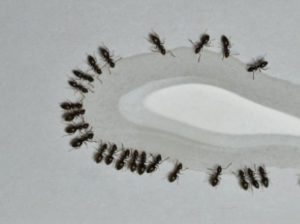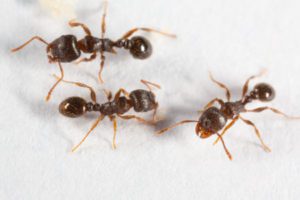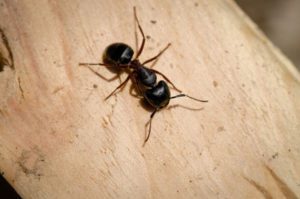“HOW CAN I GET RID OF KITCHEN ANTS?”
By Zachary Ciras on March 30, 2021.
They’re baaack! With all the pandemic stuff, I had forgotten the fact that every year about this time our kitchen is subject to an ant invasion. Black ants getting into everything. We put out some ant baits but it seems like the ants would just disappear from one spot and turn up in another. I’d rather not have to deal with this for weeks. What can we do to get the ants out of here?

Odorous House Ants eating ant bait
Well, you’re not alone. Most every home is invaded by nuisance ants at one time or another, and spring invasions are common (see Indoor Ant Invasions are a Rite of Spring!). Almost always, these seasonal invasions originate from the outside. Various ant species are involved and they usually move inside in response to a change in outside weather conditions or a change in their outside food supply. Randomly foraging ants may move back outside fairly soon, or if they find food indoors, recruits will be summoned and the invasion can go on for some time.
NUISANCE ANTS OR CARPENTER ANTS?
In some cases, a professional inspection will determine that the ants are nesting inside the home instead, usually around the foundation, and are just foraging into new areas of their indoor environment. These cases are fairly easily resolved if the nest (or nests) can be located or if the ants are easily baited. Ants nesting inside can be a more serious problem though if the ants are carpenter ants.
Carpenter ants are larger than other ants and usually all black in color. Carpenter ants damage wood as they excavate it for nest sites so control of these ants is important whether they are nesting inside or just foraging in from outside. For clues as to whether you might have carpenter ants, see Are These Carpenter Ants?

Pavement ants
There are several species of little ants that will forage inside on occasion from an outside colony. Some can even establish satellite nests inside if conditions suit. For example, pavement ants commonly nest beneath sidewalks, driveways, stonewalls, patios, and under foundation slabs, and will wander inside. Certain ant species, such as the acrobat ant, typically feed on the sugary “honeydew” exuded by plant-sucking insects like aphids. When aphids are not yet available on outdoor plants, these ants search for food elsewhere and will forage inside.
WHY DIDN’T MY BAITING WORK AGAINST THE ANTS?
Most ant food baits are designed to be carried back to the colony where they can affect other ants, and results can take some time. Ants that are randomly foraging in your home find the bait and then leave a scent trail to recruit other ants to the bait, as well. The baits that you placed might have had some effect, but new ants were probably moving in to replace those that died. It’s hard to gauge success unless you keep bait available until the ants are gone.
When baiting for ants, selecting the right type of bait (sweets or proteins) for the ant species, and proper placement of the bait stations along ant trails is crucial. Some ants prefer to feed on sugars and others prefer oils and fats. The same ant species may even switch its food preferences seasonally. Another reason why it’s important to identify the type of ant involved.
ELIMINATE EVEN THE TINIEST FOOD SPILLS
One obvious way to speed up the ants’ exit is to stop feeding them. If they’re mostly in your kitchen, be extra diligent about cleaning up crumbs and spills. People tend not to realize that pet food is also ant food; clean up spilled kibble and don’t leave pet food out for extended periods. If either you or your pest management professional has placed ant food baits, you will definitely want to eliminate any competing food sources so that the ants will be drawn to the baits instead.
Be sure to coordinate with your technician to ensure a successful ant baiting program. It’s important to keep kitchen surfaces clean but don’t use household insecticides or strong cleaners near areas that have been treated or baited for ants. See How to Keep Ants Out of Your Home.

Carpenter ant
Give Colonial Pest a call. Our experts can determine the species of ants and whether they are nesting inside or outside. We can then implement controls that will eliminate the foragers and keep ants out, guaranteed! And we observe COVID-19 precautions, including remote contact when possible and distancing when necessary.
For more on pest ants, see these Colonial blogs: